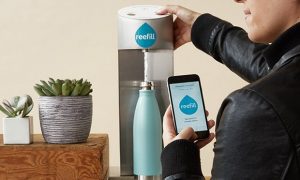Reefill has reinvented the water fountain as a Bluetooth-enabled subscription service. Photograph: Reefill.
It’s a hot day in New York City. You’re thirsty, but your water bottle is empty. So you walk into a store and place your bottle in a machine. You activate the machine with an app on your phone, and it fills your bottle with tap water. Now you are no longer thirsty.
This is the future envisioned by the founders of a startup called Reefill. If the premise sounds oddly familiar, that’s because it is: Reefill has reinvented the water fountain as a Bluetooth-enabled subscription service. Customers pay $1.99 a month for the privilege of using its machines, located at participating businesses around Manhattan.
Predictably, the company has already come in for its fair share of ridicule. In Slate, Henry Grabar called it “tap water in a suit”. But while Reefill is a particularly cartoonish example, its basic business model is a popular one within tech. The playbook is simple: take a public service and build a private, app-powered version of it.
The most obvious examples are Uber and Lyft, which aspire not merely to eliminate the taxi industry, but to replace public transportation. They’re slowly succeeding: municipalities around America are now subsidizing ride-hailing fares instead of running public buses. And earlier this year, Lyft began offering a fixed-route, flat-rate service called Lyft Shuttle in Chicago and San Francisco – an aggressive bid to poach more riders from public transit.
These companies wouldn’t have customers if better public alternatives existed. It can be hard to find a water fountain in Manhattan, and public transit in American cities ranges from mediocre to nonexistent. But solving these problems by ceding them to the private sector ensures that public services will continue to deteriorate until they disappear.
Decades of defunding and outsourcing have already pushed public services to the brink. Now, fortified with piles of investor cash and the smartphone, tech companies are trying to finish them off.
Proponents of privatization believe this is a good thing. For years, they have advanced the argument that business will always perform a given task better than government, whether it’s running buses or schools, supplying healthcare or housing. The public sector is sclerotic, wasteful and undisciplined by the profit motive. The private sector is dynamic, innovative and, above all, efficient.
This belief has become common sense in political life. It is widely shared by the country’s elite, and has guided much policymaking over the past several decades. But like most of our governing myths, it collapses on closer inspection.
No word is invoked more frequently or more fervently by apostles of privatization than efficiency. Yet this is a strange basis on which to build their case, given the fact that public services are often more efficient than private ones. Take healthcare. The United States has one of the least efficient systems on the planet: we spend more money on healthcare than anyone else, and in return we receive some of the worst health outcomes in the west. Not coincidentally, we also have the most privatized healthcare system in the advanced world. By contrast, the UK spends a fraction of what we do and achieves far better results. It also happens to provision healthcare as a public service. Somehow, the absence of the profit motive has not produced an epidemic of inefficiency in British healthcare. Meanwhile, we pay nearly $10,000 per capita and a staggering 17% of our GDP to achieve a life expectancy somewhere between that of Costa Rica and Cuba.
A profit-driven system doesn’t mean we get more for our money – it means someone gets to make more money off of us. The healthcare industry posts record profits and rewards its chief executives with the highest salaries in the country. It takes a peculiar frame of mind to see this arrangement as anything resembling efficient.
Attacking public services on the grounds of efficiency isn’t just incorrect, however – it’s beside the point. Decades of neoliberalism have corroded our capacity to think in non-economic terms. We’ve been taught that all fields of human life should be organized as markets, and that government should be run like a business. This ideology has found its perverse culmination in the figure of Donald Trump, a celebrity billionaire with no prior political experience who catapulted himself into the White House by invoking his expertise as an businessman. The premise of Trump’s campaign was that America didn’t need a president – it needed a CEO.
Nowhere is the neoliberal faith embodied by Trump more deeply felt than in Silicon Valley. Tech entrepreneurs work tirelessly to turn more of our lives into markets and devote enormous resources towards “disrupting” government by privatizing its functions. Perhaps this is why, despite Silicon Valley’s veneer of liberal cosmopolitanism, it has a certain affinity for the president. On Monday, Trump met with top executives from Apple, Amazon, Google and other major tech firms to explore how to “unleash the creativity of the private sector to provide citizen services”, in the words of Jared Kushner. Between Trump and tech, never before have so many powerful people been so intent on transforming government into a business.
But government isn’t a business; it’s a different kind of machine. At its worst, it can be repressive and corrupt and autocratic. At its best, it can be an invaluable tool for developing and sustaining a democratic society. Among other things, this includes ensuring that everyone receives the resources they need to exercise the freedoms on which democracy depends. When we privatize public services, we don’t just risk replacing them with less efficient alternatives – we risk damaging democracy itself.
If this seems like a stretch, that’s because pundits and politicians have spent decades defining the idea of democracy downwards. It has come to mean little more than holding elections every few years. But this is the absolute minimum of democracy’s meaning. Its Greek root translates to “rule of the people” – not rule by certain people, such as the rich (plutocracy) or the priests (theocracy), but by all people. Democracy describes a way of organizing society in which the whole of the people determine how society should be organized.
What does this have to do with buses or schools or hospitals or houses? In a democracy, everyone gets to participate in the decisions that affect their lives. But that’s impossible if people don’t have access to the goods they need to survive – if they’re hungry or homeless or sick. And the reality is that when goods are rationed by the market, fewer people have access to them. Markets are places of winners and losers. You don’t get what you need – you get what you can afford.
By contrast, public services offer a more equitable way to satisfy basic needs. By taking things off the market, government can democratize access to the resources that people rely on to lead reasonably dignified lives. Those resources can be offered cheap or free, funded by progressive taxation. They can also be managed by publicly accountable institutions led by elected officials, or subject to more direct mechanisms of popular control.
These ideas are considered wildly radical in American politics. Yet other places around the world have implemented them with great success. When Oxfam surveyed more than 100 countries, they discovered that public services significantly reduce economic inequality. They shrink the distance between rich and poor by lowering the cost of living. They empower working people by making their survival less dependent on their bosses and landlords and creditors. Perhaps most importantly, they entitle citizens to a share of society’s wealth and a say over how it’s used.
But where will the money come from? This is the perennial question, posed whenever someone suggests raising the welfare state above a whisper. Fortunately, it has a simple answer. The United States is the richest country in the history of the world. It is so rich, in fact, that its richest people can afford to pour billions of dollars into a company such as Uber, which loses billions of dollars each year, in the hopes of getting just a little bit richer. In the face of such extravagance, diverting a modest portion of the prosperity we produce in common toward services that benefit everyone shouldn’t be controversial. It’s a small price to pay for making democracy mean more than a hollow slogan, or a sick joke.





